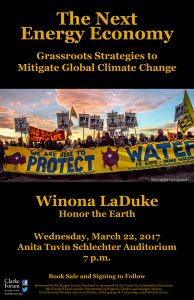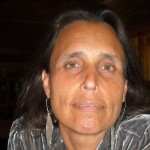 Executive Director, Honor the Earth
Executive Director, Honor the Earth
Morgan Lecture
The Next Energy Economy: Grassroots Strategies to Mitigate Global Climate Change & How We Move Ahead
Wednesday, March 22, 2017
(Rescheduled from Fall 2016)
Anita Tuvin Schlechter Auditorium, 7 p.m.
Native American writer and activist Winona LaDuke will draw from her grassroots experiences, including the #NoDAPL movement at Standing Rock, to explore how we can move forward to create a new energy economy. A book sale and signing will follow the presentation.
This program is sponsored by the Clarke Forum for Contemporary Issues and the Morgan Lecture Fund and co-sponsored by the Center for Sustainability Education, the Churchill Fund and the Departments of Women’s, Gender and Sexuality Studies, Environmental Studies, American Studies, Anthropology & Archaeology and Political Science. It is also part of the Clarke Forum’s Leadership in an Age of Uncertainty Series and part of the Clarke Forum’s Fall 2016 semester theme, Food.
 Biography (provided by the speaker)
Biography (provided by the speaker)
Winona LaDuke is an internationally renowned activist working on issues of sustainable development renewable energy and food systems. She lives and works on the White Earth reservation in northern Minnesota, and is a two-time vice presidential candidate with Ralph Nader for the Green Party.
As executive director of the Honor the Earth, she works nationally and internationally on the issues of climate change, renewable energy, and environmental justice with indigenous communities. And in her own community, she is the founder of the White Earth Land Recovery Project, one of the largest reservation based nonprofit organizations in the country, and a leader in the issues of culturally based sustainable development strategies, renewable energy, and food systems. In this work, she also continues national and international work to protect Indigenous plants and heritage foods from patenting and genetic engineering.
In 2007, LaDuke was inducted into the National Women’s Hall of Fame, recognizing her leadership and community commitment. In 1994, she was nominated by Time magazine as one of America’s 50 most promising leaders under 40. She has been awarded the Thomas Merton Award in 1996, Ms. Woman of the Year (with the Indigo Girls) in 1997, and the Reebok Human Rights Award, with which in part she began the White Earth Land Recovery Project. The White Earth Land Recovery Project has won many awards, including the prestigious 2003 International Slow Food Award for Biodiversity, recognizing the organization’s work to protect wild rice from patenting and genetic engineering.
A graduate of Harvard and Antioch Universities, she has written extensively on Native American and environmental issues. She is a former board member of Greenpeace USA and is presently an advisory board member for the Trust for Public Lands Native Lands Program as well as a board member of the Christensen Fund. The author of five books, including Recovering the Sacred, All Our Relations, and a novel, Last Standing Woman, she is widely recognized for her work on environmental and human rights issues.
Morgan Lectureship
The Morgan Lectureship was endowed by the board of trustees in 1992, in grateful appreciation for the distinguished service of James Henry Morgan of the Class of 1878, professor of Greek, dean, and president of the College. The lectureship brings to campus a scholar in residence to meet informally with individuals and class groups, and to deliver the Morgan Lecture on topics in the social sciences and humanities. Recent scholars have been Jorge Luis Borges, Francis Fukuyama, Michael Ignatieff, Samantha Power, Art Spiegelman, Sandra Steingraber, Kay Redfield Jamison and Patricia Hill Collins.
